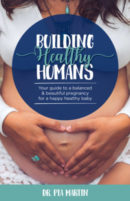What are Humans Made Of?
I thought you might enjoy this excerpt from my best selling book ” Building Healthy Humans“. So many people have told me that the information contained in the book is great. They say it is relevant whether you are Building a Human (planning a pregnancy or are currently pregnant) or Being a Human (which is most of the time). Taking care of the fundamentals is a very good place to start. Enjoy and if you know a couple who is planning a pregnancy or is newly pregnant please share this information with them and if they want more the book is available on amazon.
What Are Healthy Humans Made Of?
Our bodies are amazing!
The body can convert the foods we eat into the basic building blocks for us to grow, repair, digest, and think, and most importantly to provide us with energy.
That being said, some foods are more bioavailable (take less energy and resources to breakdown into useable form) than others. Bioavailable foods are those whole foods that are found in nature.
Knowing this, imagine the steps the body must take to convert a food or substance with a lot of chemicals or a ton of preservatives with names you cannot pronounce, into energy. Also imagine how much extra work the liver will have to do to eliminate those toxins from these so-called foods! These foods have little or no nutritional value, yet they require a ton of energy.
Let food be thy medicine and medicine be thy food.
—Hippocrates
So back to our question of what are humans made of; the human body is made up of approximately 50 percent water, 30 percent fat, 15 percent protein, 3.5 percent minerals, and 1.5 percent carbs. These numbers differ based on gender, race, etc. However, this gives you a clearer picture of what you might decide to eat if you want to provide the basic building blocks to build a healthy human.
Water
Water is the most abundant building block, and it is important
to get enough of it for your body to function efficiently. Staying hydrated is especially important if you are pregnant. Water is needed to form the amniotic fluid and flush toxins that are harmful out of the body to protect your baby.
Note: If you are drinking a lot of water and find yourself peeing a lot, consider adding a little Celtic sea salt to your food. It helps to keep the water in the body by balancing electrolytes. If that does not help, please have your blood glucose checked.
At twenty-eight weeks of pregnancy, your baby is mostly water! So drink plenty of water and add high water content veggies and fruit to your diet.
Fats
Since our bodies and brains need fat, a low-fat diet is a bad idea, especially when you are pregnant and have the desire to have a healthy baby.
Eating the right kinds of fats, like avocados, fish, nuts, and seeds, etc., does not make you fat! Good fats do not cause weight gain. Good fats make you feel more satiated. When you eat foods that are good for you, your body is getting the nutrients it needs.
Good fats are needed to make cholesterol, which is the central building block for cell walls and baby’s brain growth and is a precursor for hormones. Good fats also regulate the inflammatory response and help keep your blood sugar stable.
Protein
Protein is used to make the structural components of our bodies. This includes things like tendons, cartilage, muscles, internal organs, skin, hair, and bones. Not all proteins are considered equal. Some are easier to digest than others, and some can cause an allergy or sensitivity reaction. (Think soy,eggs or gluten.)
Protein digestion and absorption require good stomach acid.
If you have low stomach acid and you have problems with digestion, contact your healthcare practitioner, as you might need to supplement with HCL (hydrochloric acid) and or digestive enzymes.
Minerals
Much of the body is made up of the following key minerals: calcium, phosphorous, and potassium. These minerals are essential for good bone health.
The rest of the body is made up of magnesium, chlorine, iodine, iron, sodium, and sulfur. There are also trace amounts of cobalt, chromium, copper, manganese, selenium, vanadium, zinc, and others. Eating lots of dark green leaves and veggies is where you can ensure you will have a good supply of minerals. Having said that, most pregnant moms will need to supplement to accommodate the needs of their growing baby.
In order to absorb calcium you need good stomach acid, and
in order to have good stomach acid you need calcium. As we discussed earlier, if you are having issues digesting protein then you know you are not absorbing calcium. It is possible that you might need to supplement with vitamin D. If vitamin D is low, then it can have an effect on your calcium levels. Have your vitamin
D levels checked, and if low get outside for twenty minutes a day and supplement. Optimal levels of vitamin D are 40–80 mg/ml. If your levels remain low you will need to dig a little deeper to see why you are not converting and absorbing vitamin D.
Carbohydrates
Your body needs carbs for energy. However, you should aim to
get most of your carbs from vegetables, legumes, low glycemic fruits, and seeds like quinoa. Grains like Basmati rice, buckwheat, amaranth, and farro are also good choices, as most people tolerate them well.
Let’s just say that although sugar is a carb, it is not a good carb and causes major endocrine disruption. I know you know, so enough said.
Enjoy and have a healthy humans week
Dr Pia











